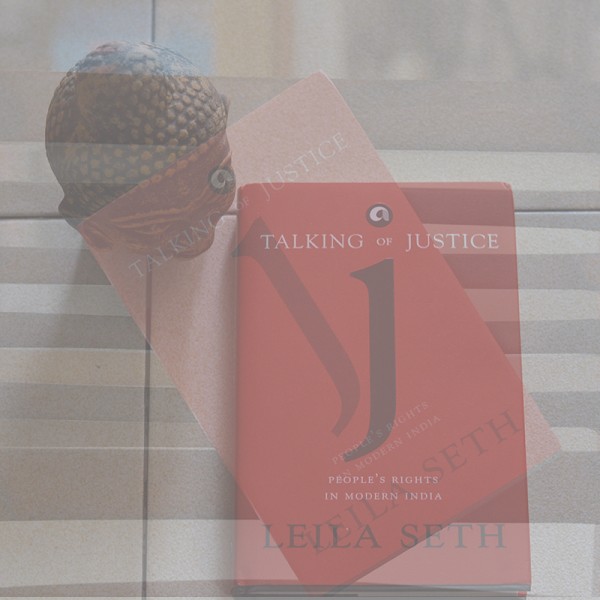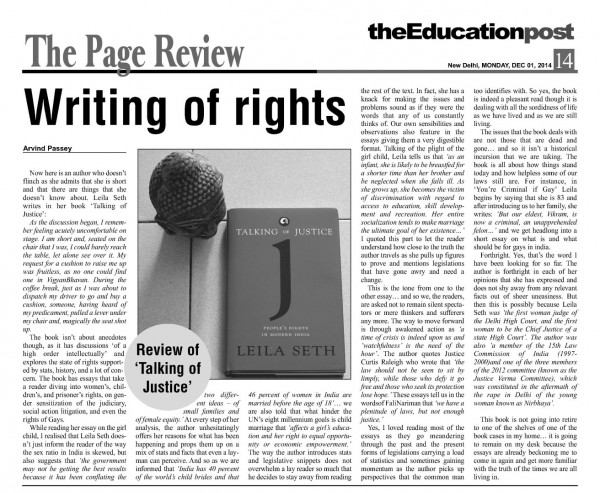Now here is an author who doesn’t flinch as she admits that she is short and that there are things that she doesn’t know about. Leila Seth writes in her book ‘Talking of Justice’:
As the discussion began, I remember feeling acutely uncomfortable on stage. I am short and, seated on the chair that I was, I could barely reach the table, let alone see over it. My request for a cushion to raise me up was fruitless, as no one could find one in Vigyan Bhavan. During the coffee break, just as I was about to dispatch my driver to go and buy a cushion, someone, having heard of my predicament, pulled a lever under my chair and, magically the seat shot up.
The book isn’t about anecdotes though, as it has discussions ‘of a high order intellectually’ and explores the state of rights supported by stats, history, and a lot of concern. The book has essays that take a reader diving into women’s, children’s, and prisoner’s rights, on gender sensitization of the judiciary, social action litigation, and even the rights of Gays.
While reading her essay on the girl child, I realised that Leila Seth doesn’t just inform the reader of the way the sex ratio in India is skewed, but also suggests that ‘the government may not be getting the best results because it has been conflating the two different ideas – of small families and of female equity.’ At every step of her analysis, the author unhesitatingly offers her reasons for what has been happening and props them up on a mix of stats and facts that even a layman can perceive. And so as we are informed that ‘India has 40 percent of the world’s child brides and that 46 percent of women in India are married before the age of 18’… we are also told that what hinder the UN’s eight millennium goals is child marriage that ‘affects a girl’s education and her right to equal opportunity or economic empowerment.’ The way the author introduces stats and legislative snippets does not overwhelm a lay reader so much that he decides to stay away from reading the rest of the text. In fact, she has a knack for making the issues and problems sound as if they were the words that any of us constantly thinks of. Our own sensibilities and observations also feature in the essays giving them a very digestible format. Talking of the plight of the girl child, Leila tells us that ‘as an infant, she is likely to be breastfed for a shorter time than her brother and be neglected when she falls ill. As she grows up, she becomes the victim of discrimination with regard to access to education, skill development and recreation. Her entire socialization tends to make marriage the ultimate goal of her existence…’ I quoted this part to let the reader understand how close to the truth the author travels as she pulls up figures to prove and mentions legislations that have gone awry and need a change.
This is the tone from one to the other essay… and so we, the readers, are asked not to remain silent spectators or mere thinkers and sufferers any more. The way to move forward is through awakened action as ‘a time of crisis is indeed upon us and ‘watchfulness’ is the need of the hour’. The author quotes Justice Curtis Raleigh who wrote that ‘the law should not be seen to sit by limply, while those who defy it go free and those who seek its protection lose hope.’ These essays tell us in the words of Fali Nariman that ‘we have a plenitude of laws, but not enough justice.’
Yes, I loved reading most of the essays as they go meandering through the past and the present forms of legislations carrying a load of statistics and sometimes gaining momentum as the author picks up perspectives that the common man too identifies with. So yes, the book is indeed a pleasant read though it is dealing with all the sordidness of life as we have lived and as we are still living.
The issues that the book deals with are not those that are dead and gone… and so it isn’t a historical incursion that we are taking. The book is all about how things stand today and how helpless some of our laws still are. For instance, in ‘You’re Criminal if Gay’ Leila begins by saying that she is 83 and after introducing us to her family, she writes: ‘But our eldest, Vikram, is now a criminal, an unapprehended felon…’ and we get headlong into a short essay on what is and what should be for gays in india.
Forthright. Yes, that’s the word I have been looking for so far. The author is forthright in each of her opinions that she has expressed and does not shy away from any relevant facts out of sheer uneasiness. But then this is possibly because Leila Seth was ‘the first woman judge of the Delhi High Court, and the first woman to be the Chief Justice of a state High Court’. The author was also ‘a member of the 15th Law Commission of India (1997-2000) and one of the three members of the 2012 committee (known as the Justice Verma Committee), which was constituted in the aftermath of the rape in Delhi of the young woman known as Nirbhaya’.
This book is not going into retire to one of the shelves of one of the book cases in my home… it is going to remain on my desk because the essays are already beckoning me to come in again and get more familiar with the truth of the times we are all living in.
.
Details of the Book:
Title: Talking of Justice: People’s Rights in Modern India
Author: Leila Seth
Publisher: ALEPH. Promoted by Rupa Publications India
ISBN: 978-93-82277-96-5
Price: Rs 500/- (in 2014)
.
.
Review published in ‘The Education Post’ dated 01 December 2014:
.
.
.
From AMAZON: Talking of Justice: People’s Rights in Modern India
From FLIPKART: Buy Talking of Justice : Peoples Rights in Modern India
.
.
Arvind Passey
25 November 2014











